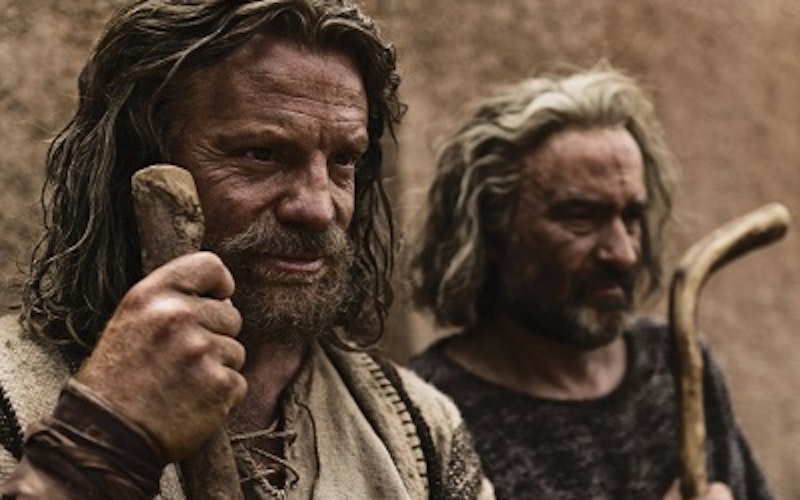
TV
The character missing from History’s Bible
Sometimes if I’m on my own I’ll grab a frozen dinner from the grocery store. If I’m in the right mood those Hungry Man boxes always look good enough for Thanksgiving dinner. While the meals aren’t actually bad, they’re by no means Thanksgiving-ready. A frozen meal is never going to replace a home-cooked meal. (Hold that thought.)
There’s been a lot of buzz about History’s new series The Bible, especially after the first episode earned huge ratings. As The Bible has begun to unfold, I’ve found myself intrigued by some credible versions of ancient stories. I’ve always wondered just how the conquest of Jericho really played out, and the frantic pursuits through the narrow alleys of that little town, as envisioned here, gave me greater respect for the courage of those spies. What’s more, the actors actually seemed grimy and sweaty in the desert, their hair looking like it hadn’t seen shampoo in a lifetime. This goes way beyond what our Sunday school flannel-graphs ever tried to do.
Nice job.
But as I turned off my TV I found myself strangely indifferent to what I’d just seen, not even sure whether I wanted to watch the next episode. This struck me as a bit curious, given that I’ve dedicated my career to telling the story of the Bible. I can’t finish an episode of White Collar without itching to see the next one, so why my underwhelming response to the Greatest Story Ever Told?
The God we have in this Bible seems pretty impersonal, kind of like the Force in Star Wars.
It then struck me that the first episodes seemed to be missing something: a main character. I hadn’t seen much of God. God’s part had clearly been written in. The story opened with His act of creation, soon followed by an impressive CGI flood by His design. I saw a steady stream of supporting characters responding to the points where His lines should have been, but I didn’t sense much chemistry between the leading actors. Consider David, who manages the Bathsheba consequences without appearing to break a sweat. My relationship with God has certainly been much more run-of-the-mill than David’s, yet my ordinary prayers involve more drama than what I’ve seen in The Bible. Even Bruce Almighty had a couple good dust-ups between Bruce and Morgan Freeman’s God.
I would love for The Bible to help me imagine what it was like for Joshua to feel so blind-sided over his assignment that God had to repeatedly urge him not to be terrified. Or what it was really like for Samson to realize that his skirt-chasing had just ruined Israel’s hope for deliverance. Or what was really behind the “my-God-why-have-you-forsaken-me?” psalms of David during those years stuck in the cave. I’d love to have The Bible help me picture what it would be like to really get into it with the Almighty.
But for that to happen God would have to provide more than just a few voice-overs. The God we have in this Bible seems pretty impersonal, kind of like the Force in Star Wars. Granted, we’re still in the Old Testament and God is still shrouded behind that temple curtain. We’ll see what happens when the Word actually becomes flesh and makes His dwelling among the other characters.
Maybe a lot of the problem is the venue. The History channel was created for random events and stories. Scripture, however, doesn’t simply offer random stories. It offers one big Story. It tells of a perfect world ruined by foolish human choices. It tells of God’s tenacious love through the ages as He reclaims that which was lost, at the cost of His own life. It’s a story that involves the Creation-rattling clash between the kingdom of darkness and the kingdom of light. And it’s a story that points towards a happy-ever-after when the good King banishes the enemy forever and together we enjoy a feast of Biblical proportions. Maybe History would inevitably end up reducing that one great Story into a series of vignettes, inevitably masking the Main Character behind all the special effects.
All I know is that as I set my remote down on the sofa I felt a strange sense of almost. As if I’d almost experienced something really powerful. Like a frozen dinner that looked really satisfying, but could never provide more than cafeteria fare.
Topics: TV, Culture At Large, Arts & Leisure, Theology & The Church, The Bible